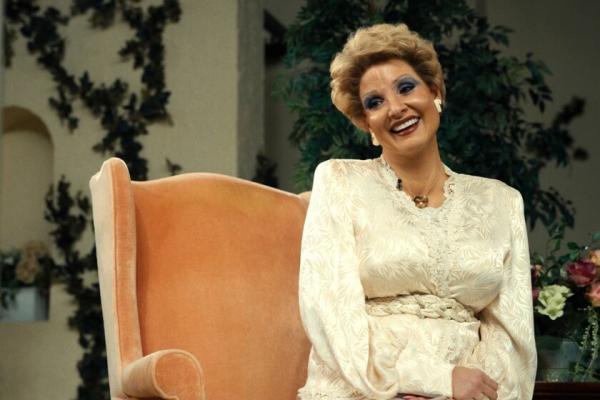A biopic about Tammy Faye Messner, better known as Tammy Faye Bakker, is ripe for caricature. That face, covered with a rainbow of lipstick, eyeliner, and mascara. That voice, with its exaggerated Upper Midwest accent. Those televangelism broadcasts, where puppet shows and hymns were followed by direct pleas for money from Tammy Faye and her first husband, Jim Bakker. She’s an easy figure to ridicule.
But The Eyes of Tammy Faye, a new biopic that shares its name with Fenton Bailey and Randy Barbato’s 2000 documentary, blessedly avoids this trap. It’s neither a goofy parody nor an earnest “based on a true story” awards-grab begging us to consider its subject with grave seriousness. Instead, the film — written by Abe Sylvia, directed by Michael Showalter, and starring Jessica Chastain as Tammy Faye — is a self-aware examination of a complicated, fascinating figure. Wisely, the film doesn’t add any flourishes to the story of the rise and fall of a televangelizing couple; the actual history is wild enough on its own.
The Eyes of Tammy Faye follows its lead from her early childhood in rural Minnesota, through her marriage to Jim Bakker (Andrew Garfield) and the ascent of their ministry, its scandalous decline in 1988, and her slow road to emotional recovery. The film has a canny eye for casting. In addition to the slight Garfield boasting a wild-but-credible Jim Bakker, Vincent D’Onofrio plays Jerry Falwell to hulking, intimidating perfection. It’s Chastain, however, who carries the enterprise, always maintaining Faye's careful balance of syrupy-sweetness, naivete, and passionately held conviction.
“It’s so complicated because she knew she was funny and ridiculous and was gonna embarrass herself, but she was in on the joke,” Chastain told Sojourners in an interview. “As long as she’s making people smile, she’s creating something positive. That’s a tough line to walk on.”
Chastain, who is also a producer of the film, admitted that taking on a role like that meant she had to put her own easily embarrassed nature to the side. “There was something about her that was so big — larger than life. I had to connect to the sense that people were gonna laugh, but she did it anyway. I had to accept that in putting myself out there, too.”
The Eyes of Tammy Faye has been a passion project of Chastain’s since she first encountered the documentary while on a press tour for her 2012 film Zero Dark Thirty. “I was so moved by her and her work with others. She knew everyone is deserving of love; it doesn’t matter where you come from,” Chastain said. “I truly believe that she was a faithful person and really believed in grace.”
Chastain was so taken by the film’s multilayered exploration of Tammy Faye that she made it a personal project to get it adapted into a drama, seeking the right screenwriter and director to make the whole thing work. She found a perfect creative partner in director Michael Showalter, who first gained recognition while acting in MTV’s absurdist sketch comedy show, The State, and went on to direct films like the empathetic rom-com The Big Sick. He’s an artist who knows how to balance camp, comedy, and emotional generosity.
The Eyes of Tammy Faye embodies that balance. The film leans into the inherent ridiculousness of the Bakkers’ opulent televangelism empire — with its hyperactive energy and corny music, squeakily sung by Chastain — and its emotionally intelligent exploration of Tammy Faye herself.
While The Eyes of Tammy Faye was created to appeal to a wide, largely secular audience, the film still manages to touch on themes of co-opted faith and women in the church. The film portrays Tammy Faye as someone who possesses spiritual ability, but is frequently silenced or minimized by the people around her: As a child, her mother keeps her out of church for fear that her fervor and ability to speak in tongues would be disruptive. As an adult, a famous interview with AIDS patient and former pastor Steve Pieters causes Falwell to demand that Jim get his wife back in line.
Chastain said she sees the film as a commentary on how a patriarchal society treats women who stand out. “For Tammy as a child, the message was: ‘Don’t put on makeup; take up less space,’” Chastain said. “But for Tammy, I think it was always the idea that God is expanding ... Anything that tells us we should be smaller is trying to erase us. We need to push against that as women.”
The Eyes of Tammy Faye doesn’t shy away from the harm the Bakkers and their evangelical movement caused and continues to cause. Ultimately, however, the film stands on the side of empathy, encouraging the audience to embrace Tammy Faye — and each other — in love and understanding. “Tammy Faye was dealt aggression and meanness, and she gave back love,” Chastain said. “She had an ability to turn darkness into light, and she saw that darkness comes from someone else’s emptiness. It’s a great lesson for everyone.”
Got something to say about what you're reading? We value your feedback!







